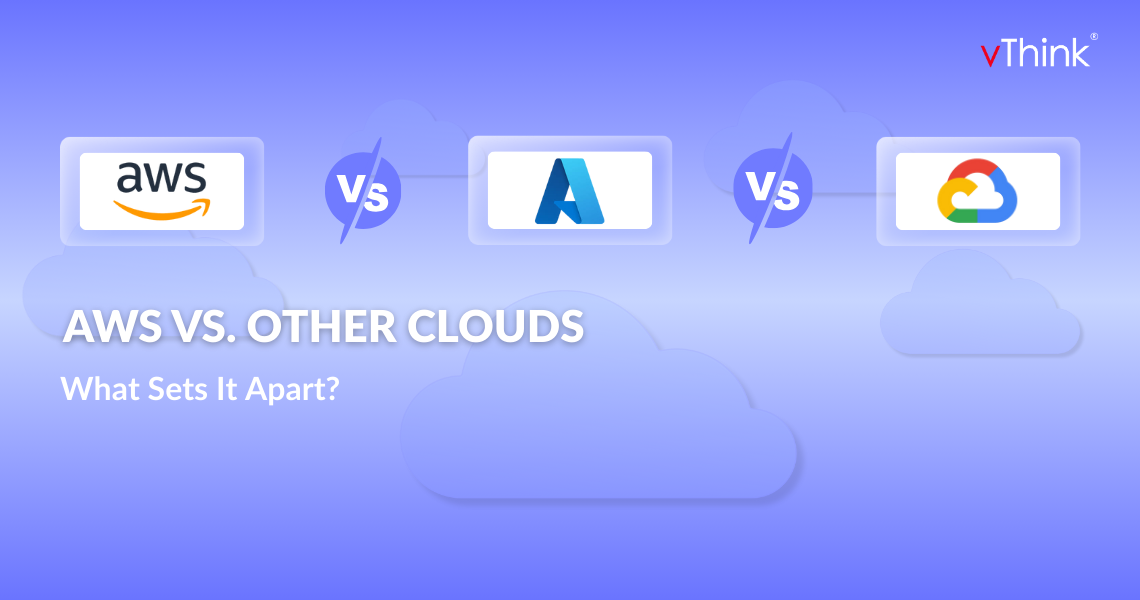AWS VS. Other Clouds - What Sets It Apart?
The cloud computing revolution has fundamentally transformed how businesses operate, scale, and innovate.

How AWS is Different from Other Cloud Service Providers
The cloud computing revolution has fundamentally transformed how businesses operate, scale, and innovate. What began as a simple way to offload server management has evolved into a sophisticated ecosystem of services that powers everything from startup MVPs to enterprise-grade applications serving billions of users. Today, organizations don't just choose a cloud provider—they choose a strategic partner that will influence their technological capabilities, operational efficiency, and competitive advantage for years to come.
The Cloud Provider Landscape: A Brief Overview
The cloud computing market is dominated by several key players, each bringing distinct advantages to the table:
Amazon Web Services (AWS) remains the undisputed market leader, having pioneered many cloud computing concepts we take for granted today. Born from Amazon's own infrastructure needs, AWS has evolved into a comprehensive platform serving millions of customers worldwide.
Microsoft Azure leverages Microsoft's decades of enterprise relationships and seamlessly integrates with the Microsoft ecosystem that many organizations already depend on. Azure has become particularly strong in hybrid cloud scenarios and enterprise migrations.
Google Cloud Platform (GCP) brings Google's expertise in data analytics, machine learning, and global infrastructure to the enterprise market. GCP often appeals to organizations prioritizing cutting-edge AI/ML capabilities and data-driven insights.
Other notable players include IBM Cloud (strong in hybrid and multi-cloud strategies), Oracle Cloud (database-centric offerings), and Alibaba Cloud (dominant in the Asian market), each carving out specialized niches in the broader cloud ecosystem.
While competition benefits customers through innovation and competitive pricing, understanding what makes each provider unique is crucial for making the right strategic choice.
How AWS Stands Apart from the Competition
Market Leadership and Proven Maturity
AWS didn't just enter the cloud computing market—it created it. Launching in 2006 with simple storage and compute services, AWS has maintained its position as the market leader for nearly two decades. This isn't just about bragging rights; it translates into tangible benefits for customers.
With over 32% of the global cloud market share (more than Microsoft Azure and Google Cloud combined), AWS has achieved a scale that creates unique advantages. This market position means AWS can invest heavily in R&D, maintain competitive pricing through economies of scale, and attract the largest ecosystem of partners and developers.
The maturity factor is equally important. AWS has weathered multiple economic cycles, scaled through various growth phases, and refined its services based on real-world feedback from millions of customers. This experience shows in the stability of their platform, the comprehensiveness of their documentation, and the depth of their support resources.
Unmatched Breadth and Depth of Services
One of AWS's most significant differentiators is the sheer scope of services available. While competitors often excel in specific areas, AWS provides a comprehensive platform that can handle virtually any workload or use case.
Compute Services: From traditional EC2 instances to cutting-edge serverless computing with Lambda, AWS offers compute options for every scenario. The recent introduction of Graviton processors demonstrates AWS's commitment to performance optimization and cost reduction.
Storage Solutions: Whether you need high-performance block storage (EBS), object storage (S3), or archival solutions (Glacier), AWS provides storage options optimized for different performance and cost requirements.
AI and Machine Learning: AWS offers one of the most comprehensive ML platforms available, from beginner-friendly SageMaker to specialized services like Rekognition for image analysis and Comprehend for natural language processing.
Serverless Computing: AWS Lambda pioneered the serverless revolution, and the platform continues to lead with services like API Gateway, DynamoDB, and Step Functions that enable completely serverless architectures.
Networking and Content Delivery: CloudFront, AWS's global CDN, and VPC networking capabilities provide enterprise-grade networking solutions that scale globally.
This breadth means organizations can build end-to-end solutions entirely within the AWS ecosystem, reducing integration complexity and vendor management overhead.
Global Infrastructure Excellence
AWS operates the most extensive global cloud infrastructure, with 84 Availability Zones across 26 geographic regions worldwide. This isn't just about geographic coverage—it's about providing low-latency access to users anywhere in the world while maintaining the highest levels of redundancy and reliability.
Each AWS region is designed to be completely independent, with multiple Availability Zones that are physically separated but connected through low-latency links. This architecture enables customers to build highly available applications that can withstand entire data center failures while maintaining performance.
Flexible and Transparent Pricing Model
AWS pioneered the pay-as-you-go pricing model that has become standard in cloud computing. However, AWS goes beyond basic usage-based pricing with a variety of options designed to optimize costs for different usage patterns.
On-Demand Pricing provides flexibility for variable workloads, while Reserved Instances offer significant discounts for predictable usage. Spot Instances allow customers to bid on spare capacity for cost-sensitive workloads, and Savings Plans provide even more flexibility with commitment-based discounts.
The pricing transparency is another differentiator. AWS provides detailed cost calculators, real-time billing information, and cost optimization recommendations through services like AWS Cost Explorer and Trusted Advisor.
Innovation Leadership and Future-Forward Thinking
AWS consistently leads the industry in innovation, releasing hundreds of new services and features each year. This isn't just about adding more services—it's about anticipating customer needs and technological trends.
Recent innovations include AWS Graviton processors (custom silicon for better price-performance), AWS Outposts (bringing AWS services to on-premises environments), and advanced AI services that democratize machine learning capabilities.
The company's culture of customer obsession drives this innovation cycle. Features and services often originate from customer feedback and real-world use cases, ensuring that new offerings solve actual business problems rather than just showcasing technical capabilities.
Comparative Insights: AWS vs. The Competition
AWS vs. Microsoft Azure: The Enterprise Battle
The competition between AWS and Azure often comes down to organizational preferences and existing technology investments. Azure provides compelling advantages for organizations heavily invested in the Microsoft ecosystem—Office 365, Active Directory, and Windows Server environments integrate seamlessly with Azure services.
However, AWS often wins on breadth of services and innovation pace. While Azure excels in hybrid scenarios and enterprise migrations, AWS provides more options for cloud-native development and advanced services like machine learning and IoT.
Choose AWS when: You're building cloud-native applications, need cutting-edge services, or want the largest selection of tools and services.
Choose Azure when: You have significant Microsoft investments, need seamless hybrid cloud capabilities, or require tight integration with Microsoft productivity tools.
Regional and Specialized Competitors
Other cloud providers often excel in specific regions or use cases. Alibaba Cloud dominates in China and Asia-Pacific, while IBM Cloud focuses on hybrid and multi-cloud strategies. Oracle Cloud targets database-intensive workloads with specialized offerings.
AWS's advantage lies in its global consistency and comprehensive service portfolio, making it a safer choice for organizations with diverse needs or international operations.
Real-World Success Stories
Netflix: Streaming at Global Scale
Netflix's journey to AWS represents one of the most successful cloud migrations in history. Facing the challenge of streaming content to over 200 million subscribers worldwide, Netflix chose AWS for its global infrastructure, scalability, and reliability.
The results speak for themselves: Netflix streams over 1 billion hours of content weekly, handles massive traffic spikes during popular show releases, and maintains 99.99% uptime. AWS's auto-scaling capabilities, global content delivery network (CloudFront), and managed database services (RDS and DynamoDB) enable Netflix to focus on content creation rather than infrastructure management.
When AWS is the Right Choice (And When It Might Not Be)
AWS is Ideal When
You're building cloud-native applications that can take full advantage of AWS's comprehensive service portfolio and serverless capabilities.
You need a wide variety of services and want to minimize vendor management complexity by using a single comprehensive platform.
Global reach is important and you need consistent performance and features across multiple geographic regions.
You want access to cutting-edge services and are comfortable adopting new technologies as they become available.
You have diverse workloads that require different types of compute, storage, and networking solutions.
You value a large ecosystem and want access to the broadest selection of third-party integrations, consulting services, and trained professionals.
Consider Alternatives When
You're heavily invested in Microsoft technologies and need seamless integration with Office 365, Active Directory, and Windows-based systems. Azure might provide better integration and lower migration costs.
You have specific data analytics and machine learning requirements that align closely with Google's strengths. GCP's BigQuery, TensorFlow integration, and data processing capabilities might be superior for data-intensive workloads.
You operate primarily in specific regions where local cloud providers offer better performance, compliance, or cost advantages. For example, Alibaba Cloud in China or local providers in countries with strict data residency requirements.
You have strict budget constraints and your workloads align well with a more limited but cost-optimized service portfolio from smaller providers.
You require specialized industry solutions that are better supported by niche cloud providers with deep vertical expertise.
The cloud provider decision ultimately depends on your specific requirements, existing technology investments, and long-term strategic goals. While AWS offers the most comprehensive platform and largest ecosystem, the "best" choice varies based on individual organizational needs.
Conclusion: Making the Strategic Choice
AWS's position as the leading cloud provider isn't just about market share—it's about providing a comprehensive, innovative, and reliable platform that enables organizations to build and scale modern applications. The combination of service breadth, global infrastructure, ecosystem strength, and innovation pace creates unique advantages that are difficult for competitors to match.
In today's competitive landscape, the question isn't whether to move to the cloud—it's how to choose the cloud partner that will best enable your organization's success. For many organizations, AWS's combination of maturity, breadth, and innovation makes it the logical choice for building the next generation of applications and services.
The cloud revolution is far from over, and AWS continues to lead in defining what the future of computing will look like. By understanding these differentiators and aligning them with your specific needs, you can make an informed decision that positions your organization for long-term success in the cloud-first world.



